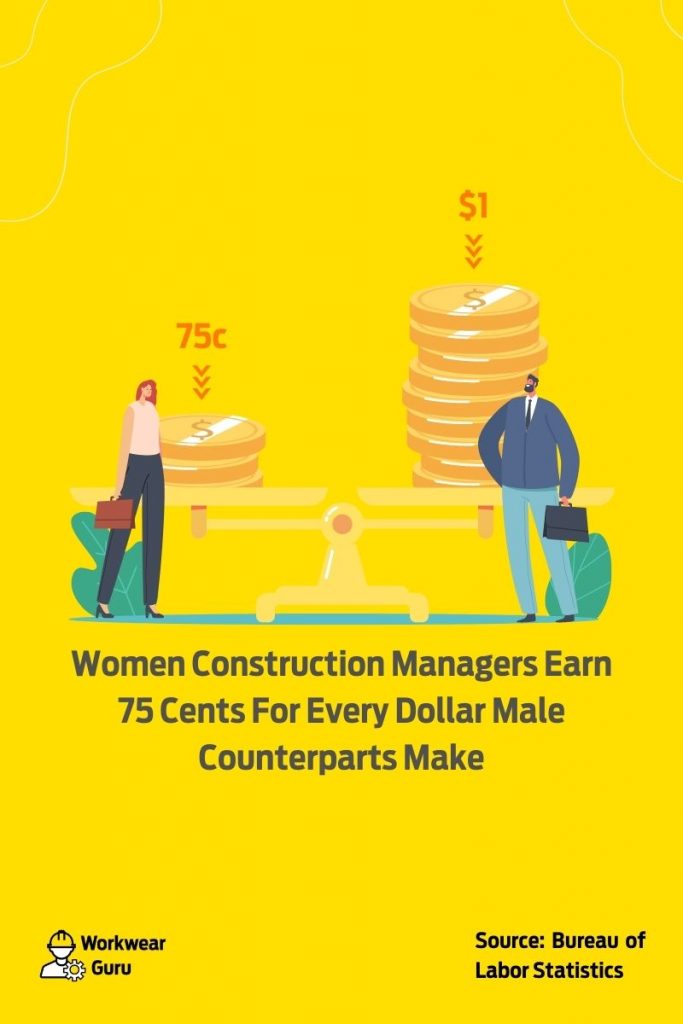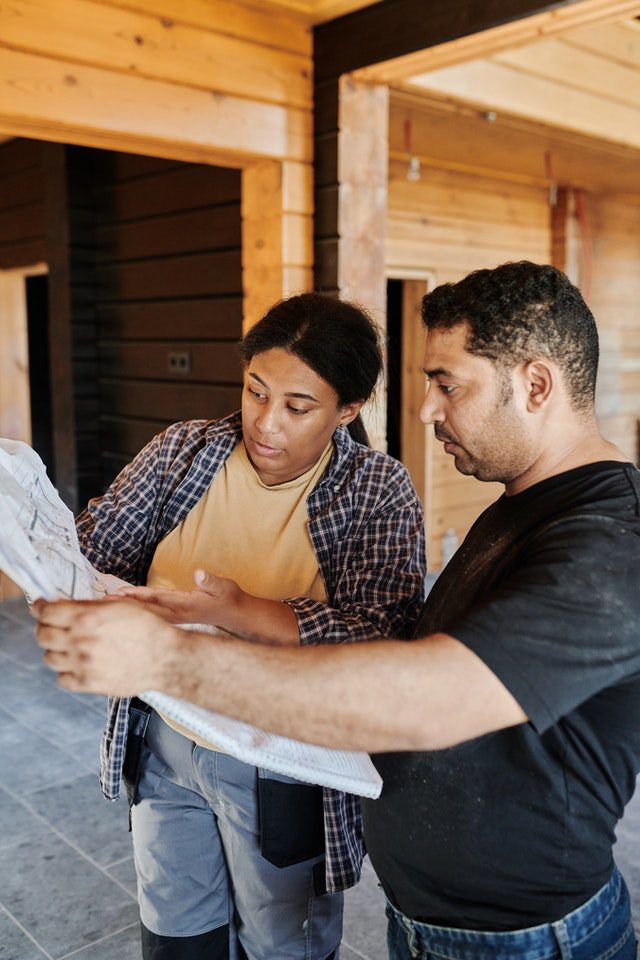How does it feel to be a woman working in a male-dominated industry? It means an everyday fight on gender bias, discrimination, pay inequality, and a bunch of mansplaining.
Though the construction industry progressed– over 1.2 million women work in construction, up from 619,000 in 1985–women continue to be a minority. Among the women working in the industry, almost 9 out of 10 women have an office role, while only 2.5% are tradespeople. The situation looks grimmer for women in higher positions as only 16% hold executive roles, and only 2% are CEOs. The issue becomes troublesome considering that 45% of women indicated that the lack of women role models working in senior positions halted advancement in their careers.
Gender discrimination was always prevalent in the construction industry, though it shows higher in today’s statistics. In 2020, the annual study of women in construction showed 72% of women in construction face discrimination, up from 66% in 2005. The increase doesn’t mean there is an increase in workplace discrimination; instead, it shows women are raising their voices for the issue.
Today, women are using social media to show the prejudice they confront every day, inspire each other to speak up, and showcase their competencies within the industry.
Between millions of videos uploaded on TikTok by women in construction, we found a common thread among the discrimination, offenses, and bias they battle. To find out what women in construction are saying, we dug over the most used TikTok hashtags by women construction workers. Below we listed the most common ones, and through interviews, we explored in-depth the challenges and difficulties women within the industry experience.
Women In Construction Are
Taking Over TikTok To Show
Discrimination They Face Everyday
TikTok has become a channel for women construction workers to portray prejudice, discrimination, sexism, and debasing they face from their male colleagues. To tell the world the bias, undermining, and sexism they confront in their workplace, women in the industry use humour and sarcasm in their videos.
INAPPROPRIATE COMMENTS IN THE WORKPLACE
“Coworkers persist on calling you babe!”
“Wow you must work out!”
“Wear more makeup!”
“Always getting stared at and hit on by old dudes!”
“So how did a pretty girl like you do end up in construction?!”
“Rough hands aren’t sexy!”
UNDERMINING THEIR SKILLS
“Getting mansplained how to do my job”
“Women can’t build houses!”
“You’re a female, you can’t work in a man’s field!”
“Work a woman’s job you’d be much better at it!”
Love the effort but women still belong in the kitchen. Not a job site. You’re hot tho!”
“Women’s opinions are ignored; nevertheless, when a guy expresses the same opinion on the same piece of work, he is respected and valued!”

WORKPLACE DISCRIMINATION
“Sharing washrooms with every other man working with”
“Never a place to pee on site”
“Not getting paid the same as your male colleagues!”
MALE-DOMINATED CULTURE
“The guys are always very concerned about helping me not get dirty!”
“You don’t look like you work in construction!”
“You’re a girl you’re too pretty to be working on such a dirty job!”
“Stop acting like a guy!”
“Dress more like a girl?!”
“Girls can’t work in construction!”
GENDER-BASED DISCRIMINATION
“Buying women’s workwear: The women AND children section together, with pink tags on the clothes to make sure we know it’s for women. Number size variation for men, but only S, M, L for women cuz our bodies look all the same!”
“Men telling me I won’t make it in the trades cuz I’m a woman!”
“Constant questions of our abilities, people say things and treat us ways the would never treat a male contractor. When you call out mistakes some subs will try to turn it around on you!”
“If you see a woman in a hardware store, don’t ask her where her husband is or if she knows how to use a hammer!”
The construction industry has a male-dominated culture
As seen in the plethora of videos, women continue to be subjected based on their appearance. “You’re a girl you’re too pretty to be working such a dirty job,” “stop acting like a guy,” or “girls can’t work in construction,” are common comments women construction workers receive. This male-dominated culture creates a toxic environment for women to work as they habitually get catcalled by their peers.
A perfect example of toxic male culture dominance in the construction industry comes from Liztheflez. Liztheflez used TikTok to share a video recording in which she talked back to a male coworker. In the video Liz called “the life of a woman in a mans world,” she explained to her coworker why she doesn’t like getting flirted and hit on during work. Her coworker, unable to understand why that would make her mad, persists in saying that calling his female coworker “babe” is not a big deal; it is just a joke. Instead, he believes she is mad because she is “not good” or “sick.”
Chlo_cecil posted on TikTok a similar situation. In the video, she imitates “a creepy old dude” who tells her, “so, have you got a boyfriend?” while working on site. A similar situation is repeatedly shared on TikTok by women in construction. “So how did a pretty girl like you do to end up in construction,” “wear more makeup,” “you are too pretty to get dirty” are some of the sexist statements women in construction mention on TikTok.
Sexism: a cause for women to leave the construction industry
For women working in construction, constant sexism can be a cause to leave the industry. Women in Construction annual research unveiled that almost half of the women (47%) believed the male-dominated culture is the main reason women leave the industry. Another 38% considered outright discrimination as the cause why women quit.
Though the sexist environment may push women out of the industry, some women are willing to fight, using TikTok to inspire other women to do the same. Like @tstrr90, who found her solution for working in a male-dominated field. Confidence in her skills, confronting coworkers head-on, and crying alone in the bathroom are ways she fights toxic environments at work.
In another instance, Zoey Mimosa, a wind turbine rescue instructor, used sarcasm to tackle the mansplaining from one of her coworkers.
Same as Zoey, others use humour to cope with gender-based discrimination in the workplace.
47% believe the male-dominated culture is the #1 reason women leave the industry.
38% considered discrimination as the cause why women quit.
Women construction workers face gender-based discrimination
Women in construction–same as in most industries– suffer from unconscious bias. Gender biases are dictated by our background, personal experience, culture, and tradition. As men in construction are unaware of their bias and the impact those biases have, they continue to undermine women’s role in the workplace.
For Morgan Ventos, a general contractor from Arizona, the industry’s stereotypes toward women hinder her job, sometimes leading to threats and verbal abuse. In an interview for us, she said, “mostly all sub-contractors are men and some of them have a very hard time taking direction from a female, especially when you stick up for yourself. I’ve been threatened and verbally abused.” As a female contractor, she frequently receives undermining comments such as “[it is your] father’s business,” “did [you] take your father’s business,” or “[you] just do the design, and he holds the license .”These comments result from the unconscious bias men in the industry hold, she said during the interview.
In 2020, 72% of women in construction said they experienced some form of gender discrimination in their careers, up from 66% in 2005Source: Construction NewsTweet
In a similar situation, Britney Mroczkowski, a contractor from Florida, said the male-dominated industry makes her push hard to prove herself in the industry. “There were times when I met subcontractors or other vendors on the construction site and they were shocked to hear my title or role in the project,” Britney during our interview. She believes as more women join construction, the “element of surprise is seen less.”
In another instance, Morgan Challes shared with 34.5K followers in TikTok shows a perfect example of the gender biases widespread in the construction industry. She shows how by signing off emails with a unisex name, the responses she accepts are unconsciously directed with male pronouns.
Besides, the unconscious bias women in construction face come from society, which continues to question women’s abilities and knowledge in trades. “If you see a woman in a hardware store, don’t ask her where her husband is or if she knows how to use a hammer,” said @glamfarmhouse in her video on TikTok. Her video shows a typical stereotypical response women construction workers confront from their peers and society.
@technically.a.tech shows on TikTok another example of the gender bias society holds for women construction workers. Skimming through the women’s workwear section, she shows how women’s and children’s work clothes are in the same unit. There is a lack of variation on sizes, and of course, they are tagged with pink.
Women in construction are consistently undermined
In a male-dominated industry, women’s skills are subverted across all positions within the industry.
Cecelia Leger, a tile installer from Nebraska, says her male colleagues are surprised when they see her at the worksite. Their male mentality can’t accept the fact that women can do hard labor.
“People are often surprised when they see me show up to job sites, and sometimes I feel like I have to prove myself,”Cecelia Leger, Tile InstallerTweet
Women working in trades are regularly slammed with words like “You’re a female, you can’t work in a man’s field,” “work a woman’s job you’d be much better at it,” “you’re a female, you can’t work in a man’s field,” and “women still belong in the kitchen.” The grim reality is reflected in statistics too. In a study done in the UK, 7 out of 10 women said gender, not skills was the reason they were dismissed for a project or role. In contrast, only 27% of men stated the same.
As a woman working in construction, Morgan Challes knows this. Morgan shared a video on TikTok portraying her life as a woman in construction. “God I wish I could do that,” she lipsynced while she acted in a situation where her male coworker gets praised instead of questioned on the same this she just did.
This reality is familiar to many women working in the industry, as reflected in a recent study with women in construction. In 2020, 33% of women stated the discrimination came from receiving a less important role, an increase of 5% from 2005. This shows that the industry continues to undermine the skills of women working in construction.
Women in construction have poor working conditions
Women construction workers represent only 1.5% of the total American workforce, leaving them a minority within the construction industry. With few attempts to improve diversity within the industry, women are left with poor working conditions.

It is no fun for any woman to share the washroom with other male colleagues. This is a common problem women construction workers lament about on TikTok. In a video Annie Buscemi posted on TikTok, she claims one of the biggest reasons she would love to see more women in trades is that if more women get involved in construction, women could have their restrooms on-site.
Inequality abounds in pay too, where women consistently get paid less than their male counterparts. For example, according to the Bureau of Labor Statistics, women construction managers earn 75 cents for every dollar a male construction manager makes. Moreover, women working in construction and extraction occupations earn 79 cents for every dollar their male coworkers earn.
Britney Mroczkowski, a general contractor from Florida, shares on TikTok why women continue to get paid less. With no surprise, the reason is directly related to the male-dominated culture prevalent in American society.
Women In Construction:
Why It Matters And
How Can We Get There?
The construction industry has a long way to achieve gender equality, though a gender-diverse workforce would greatly benefit the industry. As more women join construction, the industry’s profitability will increase. The latest McKinsey report on diversity shows that organizations with more women in executive positions are 25% more likely to achieve above-average profitability than less diverse companies. If the industry pushes for more women in leadership roles, it can make up for the $1.6 trillion loss in productivity that it is currently experiencing.
Women can increase productivity within the industry by their proven attitude toward collaboration and teamwork. Research on cooperation found that women are more open to collaboration than men. For the industry, this means an increase in productivity and efficiency. Construction projects usually involve contractors and subcontractors, and as teams get more complex, good collaboration defines the project’s success. Women working in construction agree with the findings. During our interview, Britney Mroczkowski said, “women are very good at problem-solving, analyzing, multi-tasking, and are usually pretty determined to get the job done. This combination of skills can lead to some incredible results.”
How Can We Get There?
The construction industry has a long way to include women in their workforce fully. For more women to join the industry, construction companies need to increase recruitment and improve the retention of women.
To retain women construction workers, the companies need to grow the profile of women role models, promote women in leadership roles and offer equal pay. To push more women to join the industry, women need to take on leadership roles, said Morgan Ventos during our chat. “Who better than to create a safe work environment for women other than a woman. With the struggles, we face every day other women need a strong leader to look up to,” she added.
Companies need to develop gender-inclusive hiring practices to recruit more women, such as removing gender names from the CVs. This way, the companies decrease the unconscious bias toward women joining the industry.
At the same time, construction companies need to educate young women about the industry, presenting the whole spectrum of careers it offers. As Britney Mroczkowski puts it, “construction is not just about hard hats and manual labor.” Women can work in various positions within the industry, such as design, architecture, project management, etc. But the lack of information keeps women aware of the potential of working in construction. “5 years ago, if you told me I would be a licensed general contractor, I would not have believed you. Going back even further to when I was in high school, I was never told that being a real estate developer or general contractor was an option for a future career path,” Britney added.
However, women in construction are using social media to educate and inspire women to join the industry. “I love following the #womeninconstruction hashtag. I get to see so many inspiring women who are making waves in this industry. It may be a small crowd, but they are passionate about what they do,” Britney Mroczkowski during our chat.
Article provided by workwearguru.com/women-in-construction/
Also if you would like to learn more you can find further information at https://xrsbeautyhair.com/blogs/hair-blog/workplace-hair-discrimination
Help keep news FREE for our readers
Supporting your local community newspaper/online news outlet is crucial now more than ever. If you believe in independent journalism, then consider making a valuable contribution by making a one-time or monthly donation. We operate in rural areas where providing unbiased news can be challenging. Read More About Supporting The West Wales Chronicle


























